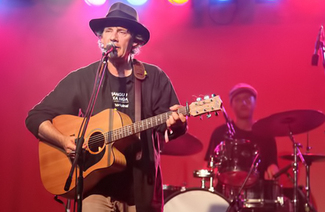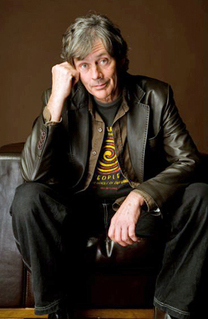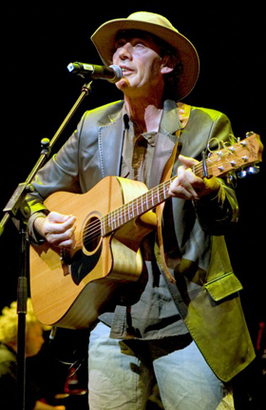Shane Howard
Words: Rob Lyon

Singer songwriter Shane Howard is recognised to most as the mainstay of folk rock group Goanna which had hits with "Solid Rock" and "Let the Franklin Flow". The band disbanded in 1987 where he pursued a solo career exploring a range of ideas including indigenous music. Passionate about justice and greater recognition of indigenous Australia his music continues to build a greater awareness of Aboriginal rights in Australia.
Returning to Adelaide to play at WOMAD with his band, his set promises to be a look backward and a greater look forward as he explains. Shane talks to Caught In The Mosh about everything from writing new music to the success of Goanna’s monster hit Solid Rock.
What does an average work day look like for Shane Howard?
It’s much more disciplined as I’ve got older as it was much more random when I was younger. If I’m not touring, it’s pretty much getting up early to write and being disciplined about that stuff. The early part of the day is the most creative, the fuzzy time before the phone rings, emails come in or anything else comes in my head.
Do you have a note pad by the bed for that idea late at night?
Sometimes there will be an idea that are being kicked around in my head or sometimes before I go to bed there will be something on my mind and you need to distil that stuff. Occasionally there will be that thing and that niggling idea that will get you in the middle of the night, which won’t go away and leave me alone. I know from experience that idea will leave me and won’t be there in the morning so I am inclined to listen to those voices and get up to jot those things down. Sometimes, rarely, whole songs will pour out or least the bones of a song will fall out.
What issues are you most passionate when you’re writing new songs?
I’ve always had a keen sense for justice right back to the days of Solid Rock. I was watching the TV program The Tall Man about Aboriginal man Cameron Doomadgee's on Palm Island and his tragic death at the hands of Senior Sergeant Chris Hurley. It is a very well made documentary and compelling story. There is a really powerful moment late in the documentary where one of the Palm Islanders says ‘I wish I was educated and more empowered because the court/jury didn’t listen to my evidence. That sort of injustice is a real issue in indigenous Australia and I thought the whole debacle on Australia Day pointed us all in a direction to all our short comings. We’ve still got such a long way to go in terms of maturing those relationships.
Returning to Adelaide to play at WOMAD with his band, his set promises to be a look backward and a greater look forward as he explains. Shane talks to Caught In The Mosh about everything from writing new music to the success of Goanna’s monster hit Solid Rock.
What does an average work day look like for Shane Howard?
It’s much more disciplined as I’ve got older as it was much more random when I was younger. If I’m not touring, it’s pretty much getting up early to write and being disciplined about that stuff. The early part of the day is the most creative, the fuzzy time before the phone rings, emails come in or anything else comes in my head.
Do you have a note pad by the bed for that idea late at night?
Sometimes there will be an idea that are being kicked around in my head or sometimes before I go to bed there will be something on my mind and you need to distil that stuff. Occasionally there will be that thing and that niggling idea that will get you in the middle of the night, which won’t go away and leave me alone. I know from experience that idea will leave me and won’t be there in the morning so I am inclined to listen to those voices and get up to jot those things down. Sometimes, rarely, whole songs will pour out or least the bones of a song will fall out.
What issues are you most passionate when you’re writing new songs?
I’ve always had a keen sense for justice right back to the days of Solid Rock. I was watching the TV program The Tall Man about Aboriginal man Cameron Doomadgee's on Palm Island and his tragic death at the hands of Senior Sergeant Chris Hurley. It is a very well made documentary and compelling story. There is a really powerful moment late in the documentary where one of the Palm Islanders says ‘I wish I was educated and more empowered because the court/jury didn’t listen to my evidence. That sort of injustice is a real issue in indigenous Australia and I thought the whole debacle on Australia Day pointed us all in a direction to all our short comings. We’ve still got such a long way to go in terms of maturing those relationships.

Do you think we’ve made any in roads as a country and as individuals?
There are always forces for and forces against, some things just take a long time like anti-slavery. I thought when I was younger when Solid Rock was out I thought change would come very quickly and a lot of things did change but there’s still a long road to go before we have real justice and real equality in this country. I don’t think we can mature as a nation until we deal with this issue. Why aren’t my kids learning the local language at school? Why can’t they sing a song in the local indigenous language or do a dance? They do that in New Zealand, we are so progressive on so many things in Australia but we’re so backward on so many other things. There’s still a flag with the Union Jack on it, nothing against the Union Jack, but a lot of English people say to me why do we have our flag on your flag. So, what happened with Gillard and the tent embassy on Australia Day was a terrible misunderstanding and almost a comedy of errors. What it highlights is this bizarre Australia Day reality that’s almost meaningless where young kids with Australian flags draped around them celebrating, then there’s Gallipoli and Bradman, there’s more to life than that. We’ve yet to develop a maturity as a nation as non-indigenous people to gain a deeper understanding of Aboriginal Australia and Dream Time stories of language and culture as well as where we come from. To me that’s what it’s all about.
Over your long career as a singer songwriter, do people expect you write another version of Solid Rock or some sort of commercial hit?
Absolutely! It’s a complex story and I have been writing a book the last couple of years trying to tell that story. None of that stuff happens by accident and yes it is a great song but hadn’t we been signed to a major label like Warner Brothers would it have seen the light of day? Would so many people have gotten to hear it? Possibly not! I’m conscious that there are a lot of factors that makes something popular and I’m very fortunate that song saying what it did, at the right place and right time, achieved commercial success and made a positive contribution to the discussion in this country.
There are always forces for and forces against, some things just take a long time like anti-slavery. I thought when I was younger when Solid Rock was out I thought change would come very quickly and a lot of things did change but there’s still a long road to go before we have real justice and real equality in this country. I don’t think we can mature as a nation until we deal with this issue. Why aren’t my kids learning the local language at school? Why can’t they sing a song in the local indigenous language or do a dance? They do that in New Zealand, we are so progressive on so many things in Australia but we’re so backward on so many other things. There’s still a flag with the Union Jack on it, nothing against the Union Jack, but a lot of English people say to me why do we have our flag on your flag. So, what happened with Gillard and the tent embassy on Australia Day was a terrible misunderstanding and almost a comedy of errors. What it highlights is this bizarre Australia Day reality that’s almost meaningless where young kids with Australian flags draped around them celebrating, then there’s Gallipoli and Bradman, there’s more to life than that. We’ve yet to develop a maturity as a nation as non-indigenous people to gain a deeper understanding of Aboriginal Australia and Dream Time stories of language and culture as well as where we come from. To me that’s what it’s all about.
Over your long career as a singer songwriter, do people expect you write another version of Solid Rock or some sort of commercial hit?
Absolutely! It’s a complex story and I have been writing a book the last couple of years trying to tell that story. None of that stuff happens by accident and yes it is a great song but hadn’t we been signed to a major label like Warner Brothers would it have seen the light of day? Would so many people have gotten to hear it? Possibly not! I’m conscious that there are a lot of factors that makes something popular and I’m very fortunate that song saying what it did, at the right place and right time, achieved commercial success and made a positive contribution to the discussion in this country.

What is important to you now and how do you judge whether you’re successful?
Being an older artist and having gone through that period of commercial success having, what I’ve learnt I’ve started writing a song Success Means Everything and there’s truth in that. Success can actually destroy your life as an artist so success isn’t something I pursue in a commercial sense and gave up on that a long time ago. What is important to me is whether I can write a song now that is meaningful to people wherever I go and play around the world? Can I write a song that will pass in to folk law and last a hundred years? Those things are more challenging than commercial success. At the same time I don’t want to be a snob about it as pop music is important as a forum for new ideas and young people. Young people should break all the rules, should experiment and throw everything up in the air and see what happens.
Are you looking forward to playing WOMAD?
I am, because it is the first time I’ve actually played in my own right. Last time it was the Iconic Songs show with Archie Roach and Neil Murray. Some of my set will be looking back with most looking forward. I don’t want to be static as an artist. There’s a great line from Gertrude Stein from Midnight In Paris where she says a role of an artist is to provide hope against the anti-ness of existence. There’s a lot of that in what you do as an artist particularly that justice stuff and creating an identity.
Being an older artist and having gone through that period of commercial success having, what I’ve learnt I’ve started writing a song Success Means Everything and there’s truth in that. Success can actually destroy your life as an artist so success isn’t something I pursue in a commercial sense and gave up on that a long time ago. What is important to me is whether I can write a song now that is meaningful to people wherever I go and play around the world? Can I write a song that will pass in to folk law and last a hundred years? Those things are more challenging than commercial success. At the same time I don’t want to be a snob about it as pop music is important as a forum for new ideas and young people. Young people should break all the rules, should experiment and throw everything up in the air and see what happens.
Are you looking forward to playing WOMAD?
I am, because it is the first time I’ve actually played in my own right. Last time it was the Iconic Songs show with Archie Roach and Neil Murray. Some of my set will be looking back with most looking forward. I don’t want to be static as an artist. There’s a great line from Gertrude Stein from Midnight In Paris where she says a role of an artist is to provide hope against the anti-ness of existence. There’s a lot of that in what you do as an artist particularly that justice stuff and creating an identity.
